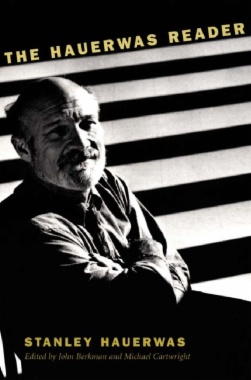Stanley Hauerwas is one of the most widely read and oft-cited theologians writing today. A prolific lecturer and author, he has been at the forefront of key developments in contemporary theology, ranging from narrative theology to the “recovery of virtue.” Yet despite his prominence and the esteem reserved for his thought, his work has never before been collected in a single volume that provides a sense of the totality of his vision.
The editors of The Hauerwas Reader, therefore, have compiled and edited a volume that represents all the different periods and phases of Hauerwas’s work. Highlighting both his constructive goals and penchant for polemic, the collection reflects the enormous variety of subjects he has engaged, the different genres in which he has written, and the diverse audiences he has addressed. It offers Hauerwas on ethics, virtue, medicine, and suffering; on euthanasia, abortion, and sexuality; and on war in relation to Catholic and Protestant thought. His essays on the role of religion in liberal democracies, the place of the family in capitalist societies, the inseparability of Christianity and Judaism, and on many other topics are included as well.
Perhaps more than any other author writing on religious topics today, Hauerwas speaks across lines of religious traditions, appealing to Methodists, Jews, Anabaptists or Mennonites, Catholics, Episcopalians, and others.
- Contents
- List of Abbreviations
- Acknowledgments
- Part I: Editorial Introductions
- John Berkman, An Introduction to The Hauerwas Reader
- William Cavanaugh, Stan the Man: A Thoroughly Biased Account of a
- Part II: Reframing Theological Ethics
- Who Are Christians? The Christian Story
- 1. How ‘‘Christian Ethics’’ Came to Be (1997)
- 2. On Keeping Theological Ethics Theological (1983)
- 3. A Retrospective Assessment of an ‘‘Ethics of Character’’:
The Development of Hauerwas’s Theological Project (1985, 2001
- 4. Why the ‘‘Sectarian Temptation’’ Is a Misrepresentation: A Response to
James Gustafson (1988)
- 5. Reforming Christian Social Ethics: Ten Theses (1981)
- 6. Jesus and the Social Embodiment of the Peaceable Kingdom (1983)
- 7. The Church as God’s New Language (1986)
- What Are Christians to Be? Christian Discipleship
- 8. Vision, Stories, and Character (1973, 2001)
- 9. A Story-Formed Community: Reflections on Watership Down (1981)
- 10. Self-Deception and Autobiography: Reflections on Speer’s Inside the
Third Reich, with David B. Burrell (1974)
- 11. Character, Narrative, and Growth in the Christian Life (1980)
- 12. The Interpretation of Scripture: Why Discipleship Is Required (1993)
- 13. Casuistry in Context: The Need for Tradition (1995)
- How Are Christians to Live? Discipleship Exemplified
- 14. Courage Exemplified, with Charles Pinches (1993)
- 15. Why Truthfulness Requires Forgiveness: A Commencement Address for
Graduates of a College of the Church of the Second Chance (1992)
- 16. Peacemaking: The Virtue of the Church (1985)
- 17. Remembering as a Moral Task: The Challenge of the Holocaust (1981)
- 18. Practicing Patience: How Christians Should Be Sick, with Charles
Pinches (1997)
- Part III: New Intersections in Theological Ethics
- The Church’s Witness: Christian Ethics after ‘‘Public Theology’’
- 19. The Servant Community: Christian Social Ethics (1983)
- 20. Should War Be Eliminated? A Thought Experiment (1984)
- 21. On Being a Church Capable of Addressing a World at War: A Pacifist
Response to the United Methodist Bishops’ Pastoral In Defense of
Creation (1988)
- 22. A Christian Critique of Christian America (1986)
- 23. Sex in Public: How Adventurous Christians Are Doing It (1978)
- 24. The Radical Hope in the Annunciation: Why Both Single and Married
Christians Welcome Children (1998)
- 25. Why Gays (as a Group) Are Morally Superior to Christians (as a Group)
(1993)
- 26. Christianity: It’s Not a Religion, It’s an Adventure (1991)
- The Church’s Hospitality: Christian Ethics after ‘‘Medical Ethics’’
- 27. Salvation and Health: Why Medicine Needs the Church (1985)
- 28. Should Suffering Be Eliminated? What the Retarded Have to Teach Us (1984)
- 29. Memory, Community, and the Reasons for Living: Reflections on
Suicide and Euthanasia, with Richard Bondi (1976)
- 30. Must a Patient Be a Person to Be a Patient? Or, My Uncle Charlie Is Not
Much of a Person, But He Is Still My Uncle Charlie (1975)
- 31. Abortion, Theologically Understood (1991)
- Michael G. Cartwright, Stanley Hauerwas’s Essays in Theological Ethics: A Reader’s Guide
- Selected Annotated Bibliography
- Scripture References
- Name Index
- Subject Index

